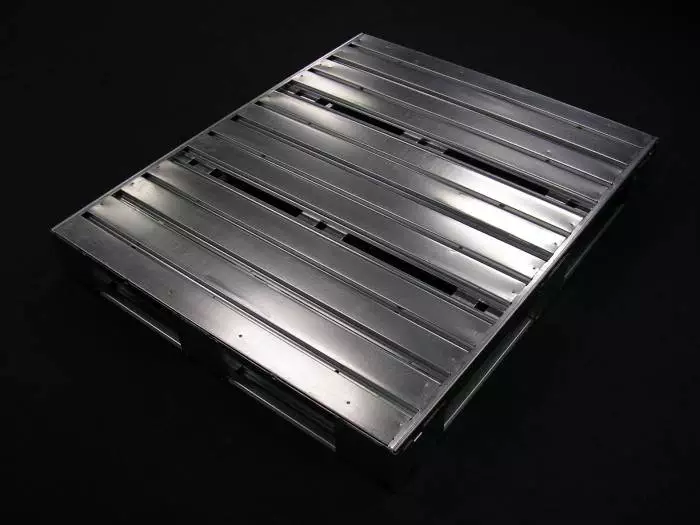Plastic Pallets Vs The Competitors: Who “Stacks” Highest?
/in News, Resources/by Mallory PriddyPallets play a critical role in material handling, shipping, and storage aspects of businesses across the globe.
In fact, according to The Balance, the evolution of pallets “has been integral to the development of modern logistics,” changing supply chains and influencing the way that we do business.
A pallet may sound like a simple thing, but in reality, pallets can make or break your business.
This is why it is important to choose a durable and cost-effective pallet that will make your workplace more efficient and profitable.
In this article, we discuss all things pallets, including the ins and outs of wood, metal and cardboard pallets and why plastic pallets may be the best choice for your business.
Plastic pallets are the way of the future
If you are looking for an innovative and cost-effective alternative to traditional wooden, metal, and cardboard pallets, plastic pallets may be the perfect solution to your material handling needs.
Benefits of plastic pallets
Durable

Thanks to this sturdy design without seams or weak points, the strongest plastic pallets on the market can hold up to 3,500 pounds without breaking.
Safe alternative to wood
When wood pallets break (and they often do!), the resulting splintered wood and nails often contaminate both the work environment and the product.
Hazardous materials that create slip and trip risks in your workspace are a liability that can easily be avoided by switching to durable plastic alternatives.
Reusable
While wooden and cardboard pallets are often “one-and-done” in functionality, cross-ribbed plastic pallets can be used repeatedly without wear and tear.
The multi-use functionality of plastic pallets ensures that you and your business get your money’s worth instead of running out to purchase new pallets on a weekly or monthly basis.
Lightweight
Despite their strong design, plastic pallets are also relatively light, typically weighing 30 percent less than their wood counterparts.
In fact, the heaviest models on the market (that hold up to 3,500 pounds) only weigh 55 pounds.
This results in cheaper shipping costs and easier maneuverability.
Ergonomic design

This unique design reduces damage issues that are common with wooden and cardboard pallets by allowing the fork tines to deflect off the leg instead of breaking or cutting into the pallet.
Plastic pallets can also include rounded, reinforced corners and 4-way entry for handling ease.
Although they are non-rackable, plastic pallets often come with an optional stacking lip feature on the long side.
This makes them easy to stack and transport, while also preventing product slippage when they are in use.
Easy to clean
Unlike wooden and cardboard pallets, which are difficult to clean and cannot be exposed to moisture and chemicals, plastic pallets are extremely easy to clean and sanitize using a variety of techniques including steam cleaning, hot washing, and chemical sanitizing.
Plastic pallets are also designed with a smooth, flat top that aids in the cleaning process — a critical feature when working in a warehouse environment.
Environment & Budget Friendly
Due to their durable, reusable nature, plastic pallets are also an environmentally friendly option that will save money for your business in the long run.
Thanks to the cutting-edge engineering of plastic pallets, they can last for hundreds of uses, making them a cost-effective investment that pays off over time.
Plastic pallets that are crafted from 100% virgin grade plastic, are also recyclable, eliminating disposal fees and making them an environmentally-friendly choice.
Plastic Pallet FAQs
How much does a plastic pallet weigh?
One of the lightest weight pallet options on the market, plastic pallets typically weigh anywhere from 45 to 55 pounds.
This weight varies depending on both the dimensions and weight capacity of the pallet.
How much weight can a plastic pallet hold?
Every plastic pallet is manufactured with a specific weight capacity in mind.
Therefore, the specific weight that a plastic pallet can hold varies.
However, they typically can hold anywhere from 2,000 to 3,500 pounds, making them one of the strongest options available to businesses.
What is the average price of a plastic pallet?
Plastic pallet costs vary, depending on the quality of the pallet in question.
Cheaper, less durable models can start as low as $10.00.
However, when it comes to cost per use savings, it is much wiser to invest in durable plastic pallets, which can cost upwards of $150.00.
Although this may sound expensive, a quality plastic pallet is a strategic investment that will end up costing your business much less in the long run thanks to its long-lasting nature.
A Time & Place for Every Pallet
Through the years there has always been a time and place for every pallet.
From wood to metal to cardboard; each one has played its part in the necessary application.
In reviewing these different uses you will find what type of pallets work best for you.
Wood pallets
If you have worked with wood pallets, you are most likely familiar with their many pros and cons when it comes to material handling.
But, as a refresher as to what they are, or for those who do not know, we will cover them in this section.
The pros of wood pallets
Making up approximately 60 percent of all wooden containers that are produced within the United States, wooden pallets are extremely common in many industries.
This popularity is due to several key advantages of wood pallets, which include:
- Affordability
- Ease of manufacturing process
- Having high friction compared to metal and plastic pallets
- Repairability
- Recyclable nature
The cons of wood pallets
Although they are commonly used in many industries, pallets crafted from wood have many drawbacks — especially in the food handling and pharmaceutical industries where safety is a critical part of daily operations.
Because of these many cons, alternative pallet materials such as plastic and metal are quickly increasing in popularity.
Some of the downsides of wooden pallets include:
Easily damaged
Wood pallets are not durable and tend to break and splinter easily when put under pressure.
This can lead to product contamination and hazardous working conditions that can quickly become a liability.
Not forklift compatible
Due to their lack of durability, wooden pallets do not work well in warehouse environments with forklifts, where they can be easily damaged.
Difficult to keep clean
Wooden pallets are also notoriously difficult to clean and are susceptible to fungus and bacteria growth when exposed to moisture.
Their porous makeup means they are prone to infestations from bugs and rodents, which can lead to the presence of dangerous bacterias like salmonella and E.coli.
This is especially an issue in facilities that handle food and medicine.
Wood Pallet FAQs
How heavy is a wooden pallet?
The weight of wooden pallets varies depending on their dimensions and capacity.
Typically wooden pallets can weigh as little as 30 pounds and up to 70 pounds depending on its intended applications.
How much weight can a wooden pallet hold?
The weight that a wood pallet can handle depends on the size and construction of the pallet.
This said, the weight load for most wooden pallets ranges between 3,700 and 4,700 pounds.
How much does a wooden pallet cost?
Standard pallets typically cost anywhere from $11.25 to $12.50.
However, high quality pallets typically cost around $30.00.
Meanwhile, cheaper recycled options can be purchased for anywhere from $4.25 to $7.40.
Metal pallets
For those who have previously worked with metal pallets, it is probably apparent that their main benefit is extreme strength and durability due to their construction from aluminum or steel.
This makes metal pallets ideal for use in applications that need a durable and protective pallet, such as the transport of military ammunition and other heavy machinery.
Due to their durable nature, metal pallets are also an excellent option for use in outdoor storage and at-sea storage.
However, strength is not the only benefit of metal pallets.
Some of the other benefits of metal pallets include that they are:
- Easy to clean and sanitize
- Do not attract dust and dirt
- Do not attract pests
- Recyclable and environmentally friendly
- Fireproof
Because of their easy-to-clean quality as well as resistance to dirt, pests, and other potential contaminants, metal pallets are also very popular in the catering and restaurant industries.
When it comes to the disadvantages of metal pallets a few considerations to keep in mind include that they are:
- More expensive than other options
- Much heavier than pallets manufactured from plastic, wood, or cardboard
- Prone to rust and corrosion
The weight of metal pallets manufactured from steel is probably the most important drawback to keep in mind when considering purchasing metal pallets as this can make them much more expensive to use for shipping purposes and much more difficult to maneuver in warehouse settings.
However, aluminum offers a lighter alternative if you are planning to stick with a metal pallet for shipping.
Metal Pallet FAQs
How heavy are metal pallets?
Of the four types of pallets discussed here, metal pallets are the heaviest option.
The weight of metal pallets can be quite different depending on the type of metal used to manufacture the pallet.
Aluminum pallets are the lightest metal pallets available at around 55 pounds, while stainless steel models are typically the heaviest at around 75 pounds.
How much weight can a metal pallet hold?
The specific weight load that metal pallets can handle depends on several factors including its construction and material.
However, metal pallets are typically favored for heavy loads and can handle thousands of pounds of static weight, with steel pallets holding up to 8,000 pounds and aluminum pallets holding as much as 30,000 pounds.
How much do metal pallets cost?
The price of metal pallets varies greatly depending on the material used.
Traditional steel pallets are typically quite a bit cheaper than those made of sturdier metals like aluminum or stainless steel.
These higher-end steel pallets typical cost upwards of $200.00, with aluminum pallets reaching prices up to $375.00 per piece.
The pros and cons of cardboard pallets
Although they may sound like an ineffective option, cardboard pallets are actually quite popular.
In fact, home manufacturing giant IKEA chooses cardboard as their pallet of choice in most instances.
Since they are not as common as wood or plastic pallets, you may not have worked with cardboard pallets in the past, so here is a rundown of both the pros and cons of cardboard pallets.
Some of the many benefits of cardboard pallets include that they are:
- Lightweight
- Easy to clean
- Do not contain nails, splinters and other potentially dangerous hardware
- Recyclable
- Easy to break down and dispose of
- ISPM 15 compliant
The fact that cardboard pallets are ISPM 15 compliant is one of their main advantages, making them ideal for international shipping, unlike wood pallets, which can potentially transport insects and diseases across international borders.
As for the disadvantages, you probably guessed their main disadvantage, which is that they are not durable or long-lasting, limiting their use.
Other drawbacks of cardboard pallets include that they:
- Are susceptible to moisture damage
- Cannot be cleaned or sanitized
- Are typically single use due to lack of durability
- Cannot handle heavy loads
Cardboard Pallet FAQs
How much do cardboard pallets weigh?
One of the most lightweight pallet options available, cardboard pallets typically weigh around 19 pounds.
How much weight can cardboard pallets hold?
The weight that a cardboard pallet can handle depends on the type of pallet in question.
Depending on the engineering used to create the pallet, cardboard models can hold anywhere from 300 to 10,000 pounds!
How much to cardboard pallets cost?
Cardboard pallets are most likely the cheapest pallet option on the market, starting at around $7.00.
However, it is important to keep in mind that they are usually single use, which means you will end up spending much more on pallets over the long term if you use them frequently in your business operations.
The benefits of plastic pallets for quality control
If you are in food processing, pharmaceuticals, or another industry with strict quality control standards, you know how difficult it can be to find material handling products that comply with USDA and FDA regulations.
This is especially true when it comes to wooden pallets that are manufactured with nails and other metal hardware that can easily compromise your safety standards and pose the risk of contaminating your products.
In this section, we discuss why plastic pallets with no hardware are ideal for use in industries where quality control is central to your daily operations.
Manufactured from USDA + FDA approved materials
One of the main benefits of plastic pallets for use in pharmaceuticals, food processing, and similar industries is that they can be manufactured using USDA and FDA-approved polyethylene.
This 100% virgin-grade plastic means your business can enjoy the many benefits of plastic pallets, without compromising on quality control regulations.
Pallets with No Hardware = No Risky Metal Parts
The seamless one-piece design of plastic pallets eliminates the need for the metal hardware found on wooden pallets, making plastic pallets an excellent choice for companies that plan to use them as a part of their food or drug manufacturing process.
By eliminating the use of metal, your company will have one less thing to worry about when it comes to adhering to strict government regulations.
Durable construction reduces the risk of contamination from damage
As discussed, plastic pallets are also extremely durable, unlike wood pallets which easily splinter and crack.
This durability is critical for ensuring quality control and safety, as it greatly reduces the risk of your product (or workspace) being contaminated with splinters from wood pallets.
Plastic pallets eliminate the risk of bacteria and fungus
Since wood is highly susceptible to fungus and bacteria growth, plastic pallets are a much better option for food processing and pharmaceutical manufacturing.
Simply switching to plastic will greatly reduce your risk of contamination of your product in the workplace.
If you are in a material handling industry, making the switch to plastic pallets is a quick and easy way to improve your business operations.
This simple upgrade may seem like a small step, but it can impact everything from your budget to workplace efficiency, to reduced risk of liability — ultimately improving your bottom line.
While there are outliers (such as those that need to carry a heavier load), plastic pallets are the perfect choice for the average operation.
They are more expensive upfront than wood and cardboard, but come with many more benefits, including high durability.
Plastic pallets are able to be used hundreds, if not thousands of times, making them the more cost-effective option over time.
Looking for more information on plastic pallets? Contact one of Fibertech’s representatives today!
Plastic Lockers: The Benefits & Cost-Effectiveness Over Metal Lockers
/in News, Resources/by Mallory PriddyThe Ultimate Guide To Saving Time & Money With Plastic Combo Bins
/in News, Resources/by Mallory PriddyHow plastic laundry trucks are revolutionizing the commercial laundry industry
/in News, Resources/by Mallory Priddy57 Sustainable Clothing Pioneers Leading The Eco-Friendly Movement
/in News, Resources/by Mallory PriddyWhy You Should Choose Plastic Containers Over Cardboard
/in News, Resources/by Mallory Priddy
Choosing Plastic Containers over Cardboard Will Save Your Business Major Money in the Long Run
Unlike stainless steel containers and other alternatives to cardboard boxes, plastic is a cost-effective replacement that your company can actually afford to invest in! Yes, our bulk plastic containers will cost more than cardboard initially, however, unlike cardboard they have a long lifespan and can be reused again and again for years to come in even the harshest environments.
Don’t believe us? Here are just a few of the design features that ensure our durable bulk plastic containers will last your business for many years of use:
- All of our plastic containers are rotationally molded with a one-piece design. This means a solid construction with no weak points that will crack under pressure.
- Our plastic containers are constructed from high-quality polyethylene that is both USDA and FDA approved. This durable material will not degrade even in extreme temperatures (e.g. freezers) or damp food processing environments.
- Depending on the model you select, plastic containers from Fibertech can also be 2-way and 4-way forklift accessible, which means a major reduction in the chance of damage in your warehouse
 Opting for Plastic Containers Will Drastically Cut Down on Your Environmental Impact
Opting for Plastic Containers Will Drastically Cut Down on Your Environmental Impact
All businesses love to save money, which, as we discussed, is a major benefit of choosing plastic containers over cardboard when it comes to your food handling and storage needs. However, another major benefit of making the switch from plastic to cardboard is that it is an environmentally-friendly change you can feel good about!
Did you know that in 2015 alone the world consumed approximately 410 million metric tons of cardboard and paper? You heard it right. Even worse, research has shown that 36 percent of U.S. waste ending up in landfills each year is cardboard and paper, with cardboard accounting for the largest form of municipal solid waste produced by businesses annually.
Making the switch from cardboard to plastic containers is an easy way for your company to cut down on the waste you send to landfills each year and a great step towards limiting your environmental impact.
If you are ready to trade in cardboard for a durable, economical, environmentally-friendly option, it is time to make the switch to our rotationally-molded bulk plastic containers – an investment your company can feel good about. Contact us today to learn more about our wide variety of plastic containers that are certain to work for your industry.





 Opting for Plastic Containers Will Drastically Cut Down on Your Environmental Impact
Opting for Plastic Containers Will Drastically Cut Down on Your Environmental Impact



